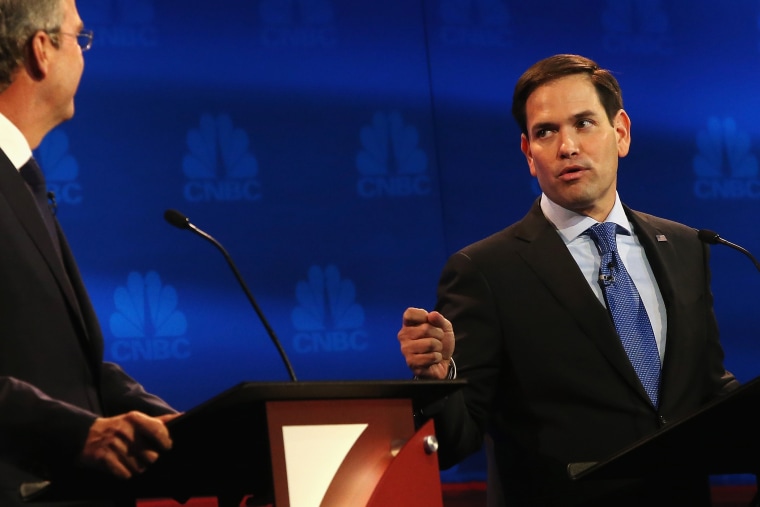In last night's debate, when Sen. Marco Rubio (R-Fla.) wasn't dazzling the media by bashing the media, he was arguably ending former Gov. Jeb Bush's (R-Fla.) presidential campaign.
BUSH: Marco, when you signed up for this, this was a six-year term, and you should be showing up to work. I mean, literally, the Senate -- what is it, like a French work week? You get, like, three days where you have to show up? You can campaign, or just resign and let someone else take the job. There are a lot of people living paycheck to paycheck in Florida as well, they’re looking for a senator that will fight for them each and every day. RUBIO: Well, it’s interesting. Over the last few weeks, I’ve listened to Jeb as he walked around the country and said that you’re modeling your campaign after John McCain, that you’re going to launch a furious comeback the way he did, by fighting hard in New Hampshire and places like that, carrying your own bag at the airport. You know how many votes John McCain missed when he was carrying out that furious comeback that you’re now modeling after? BUSH: He wasn’t my senator. RUBIO: No Jeb, I don’t remember -- well, let me tell you. I don’t remember you ever complaining about John McCain’s vote record. The only reason why you’re doing it now is because we’re running for the same position, and someone has convinced you that attacking me is going to help you.
If it was boxing, someone would have intervened to stop the fight. It was the confrontation everyone knew was coming -- Jeb telegraphed his punch for days -- but the intended target knew exactly what to say. It led to headlines about Rubio being "spectacular."
And to a degree, the gushing praise is understandable. Rubio looked as if he'd practiced that soliloquy in front of a mirror for hours, and then delivered his scripted lines nicely. Later, the far-right Floridian referenced entitlements -- Rubio is
on record condemning Medicare and Social Security for "weakening us as a people" -- and said to laughter, "Nothing has to change for current beneficiaries. My mother is on Medicare and Social Security. I’m against anything that’s bad for my mother."
It's the sort of quality that impresses debate scorers: candidates who memorize their carefully crafted lines and hit their marks are seen as the "winners."
But it's also true that we saw two very different Marco Rubios last night. The scripted senator excelled, dazzling pundits and earning hearty audience applause. The unscripted senator struggled in ways careful observers shouldn't overlook.
Consider this exchange between CNBC's Becky Quick and the senator midway through the event.
QUICK: Senator Rubio, you yourself have said that you’ve had issues. You have a lack of bookkeeping skills. You accidentally inter-mingled campaign money with your personal money. You faced foreclosure on a second home that you bought. And just last year, you liquidated a $68,000 retirement fund. That’s something that cost you thousands of dollars in taxes and penalties. In terms of all of that, it raises the question whether you have the maturity and wisdom to lead this $17 trillion economy. What do you say? RUBIO: Well, you just -- you just listed a litany of discredited attacks from Democrats and my political opponents, and I’m not gonna waste 60 seconds detailing them all.
Despite the fact that everything Quick said was 100% accurate, he then stumbled through a clumsy answer that seemed to inadvertently insult his wife. It was a legitimate line of inquiry -- Rubio hasn't just struggled with economic issues as a senator; he's struggled even more in his own personal finances -- for which the Republican had no answers.
Later, CNBC's John Harwood pressed Rubio on his ridiculous tax-cut plan.
HARWOOD: The Tax Foundation, which was alluded to earlier, scored your tax plan and concluded that you give nearly twice as much of a gain in after-tax income to the top 1 percent as to people in the middle of the income scale. Since you’re the champion of Americans living paycheck-to- paycheck, don’t you have that backward? RUBIO: No, that’s -- you’re wrong.
Actually, Harwood was
absolutely right and Rubio wasn't. The senator eventually conceded, "Yeah, but that -- because the math is, if you -- 5 percent of a million is a lot more than 5 percent of a thousand. So yeah, someone who makes more money, numerically, it’s gonna be higher."
In other words, when debating tax policy, Harwood was correct "numerically," while Rubio thinks he was correct in some other kind of way?
This was the candidate the media praised as the triumphant performer in last night's debate?
There's no denying that when Rubio sticks to his memorized talking points, he knows how to deliver them well. I'm not sure what this has to do with being an effective president, but it's a skill that seems to work on television.
But when the same candidate in the same debate shows that he can't think quickly on his feet, and his understanding of the issues can charitably be described as superficial, perhaps that matters, too?
